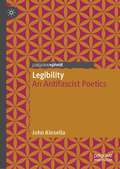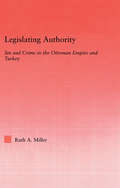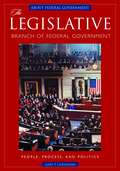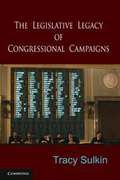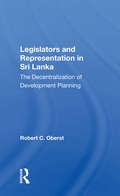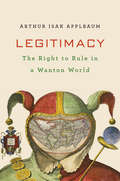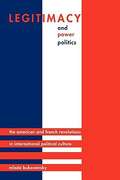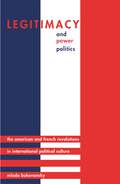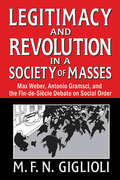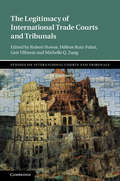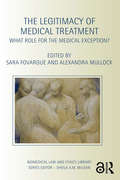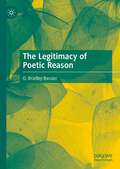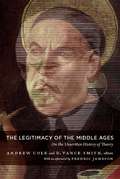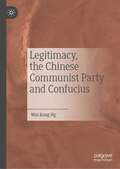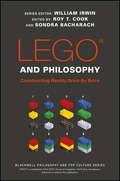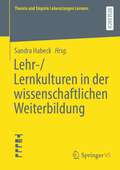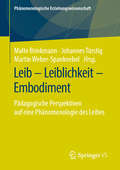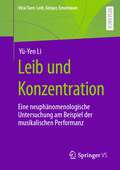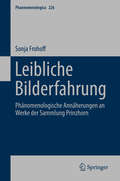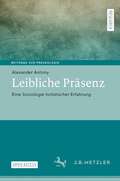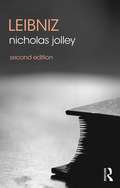- Table View
- List View
Legends in Gandhian Social Activism: Addressing Environmental Issues By Dissolving Gender And Colonial Barriers (Ecology and Ethics)
by Bidisha MallikThis book is about Madeleine Slade (1892-1982) and Catherine Mary Heilemann (1901-1982), two English associates of Mohandas K. (Mahatma) Gandhi (1869-1948), known in India as Mira Behn and Sarala Behn. The odysseys of these women present a counternarrative to the forces of imperialism, colonialism, capitalism, and globalized development. The book examines their extraordinary journey to India to work with Gandhi and their roles in India’s independence movement, their spiritual strivings, their independent work in the Himalayas, and most importantly, their contribution to the evolution of Gandhian philosophy of socio-economic reconstruction and environmental conservation in the present Indian state of Uttarakhand. The author shows that these women developed ideas and practices that drew from an extensive intellectual terrain that cannot be limited to Gandhi’s work. She delineates directions in which Gandhian thought and experiments in rural development work and visions of a new society evolved through the lives, activism, and written contributions of these two women. Their thought and practice generated a new cultural consciousness on sustainability that had a key influence in environmental debates in India and beyond and were responsible for two of the most important environmental movements of India and the world: the Chipko Movement or the movement against commercial green felling of trees by hugging them, and the protest against the Tehri high dam on the Bhagirathi River. To this day, their teachings and philosophies constitute a useful and significant contribution to the search for and implementation of global ideas of ecological conservation and human development.
Legibility: An Antifascist Poetics (Modern and Contemporary Poetry and Poetics)
by John KinsellaThis Pivot book provides a wide-ranging and diverse commentary on issues of legibility (and illegibility) around poetry, antifascist pacifist activism, environmentalism and the language of protest. A timely meditation from poet John Kinsella, the book focuses on participation in protest, demonstration and intervention on behalf of human rights activism, and writing and acting peacefully but persistently against tyranny. The book also examines how we make records and what we do with them, how we might use poetry to act or enact and/or to discuss such necessities and events. A book about community, human and animal rights and the way poetry can be used as a peaceful and decisive means of intervention in moment of public social and environmental crisis. Ultimately, it is a poetics against fascism with a focus on the well-being of the biosphere and all it contains.
Legislating Authority: Sin and Crime in the Ottoman Empire and Turkey
by Ruth MillerLegislation Authority addresses issues of law, state violence, and state authority within the Ottoman and Turkish context.
The Legislative Branch of Federal Government: People, Process, and Politics
by Gary P. GershmanPart of ABC-Clio's About Federal Government series, this book by Gershman (history and legal studies, Nova Southeastern U.) introduces the history and current realities of the US Congress to a general readership. He offers chapters on US constitutional history as it pertains to Congress; the evolving roles, functions, and powers of the legislative branch; Congressional structures and processes; leadership roles and significant individual legislators; historical and contemporary politics of the legislature; and interactions with other branches. He also offers 230 pages of historical documents, including major pieces of legislation, Supreme Court cases, and articles of impeachment. Additionally, a glossary of concepts and people and an annotated bibliography are included
Legislative Effectiveness in the United States Congress
by Craig Volden Alan E. WisemanThis book explores why some members of Congress are more effective than others at navigating the legislative process and what this means for how Congress is organized and what policies it produces. Craig Volden and Alan E. Wiseman develop a new metric of individual legislator effectiveness (the Legislative Effectiveness Score) that will be of interest to scholars, voters, and politicians alike. They use these scores to study party influence in Congress, the successes or failures of women and African Americans in Congress, policy gridlock, and the specific strategies that lawmakers employ to advance their agendas.
The Legislative Legacy of Congressional Campaigns
by Tracy SulkinDo members of Congress follow through on the appeals they make in campaigns? The answer to this question lies at the heart of assessments of democratic legitimacy. This study demonstrates that, contrary to the conventional wisdom that candidates' appeals are just 'cheap talk', campaigns actually have a lasting legacy in the content of representatives' and senators' behavior in office. Levels of promise-keeping vary in a systematic fashion across legislators, across types of activity, across time and across chamber. Moreover, legislators' responsiveness to their appeals shapes their future electoral fortunes and career choices, and their activity on their campaign themes leaves a tangible trace in public policy outputs. Understanding the dynamics of promise-keeping thus has important implications for our evaluations of the quality of campaigns and the strength of representation in the United States.
Legislator Success in Fragmented Congresses in Argentina
by Ernesto Calvo"Plurality-led Congresses are among the most pervasive and least studied phenomena in presidential systems around the world. Often conflated with divided government, where an organized opposition controls a majority of seats in congress, plurality-led congresses are characterized by a party with fewer than 50 percent of the seats still in control of the legislative gates. Extensive gatekeeping authority without plenary majorities, this book shows, leads to policy outcomes that are substantially different from those observed in majority-led congresses. Through detailed analyses of legislative success in Argentina and Uruguay, this book explores the determinants of law enactment in fragmented congresses. It describes in detail how the lack of majority support explains legislative success in standing committees, the chamber directorate, and the plenary floor"--
Legislators And Representation In Sri Lanka: The Decentralization Of Development Planning
by Robert C. OberstFocusing on the work of Sri Lankan legislators, this book offers a model of representation in examining parliamentary systems, especially those found in the Third World. It explores an important part of legislators' responsibilities as the country seeks to decentralize its development planning.
Legitimacy: The Right to Govern in a Wanton World
by Arthur Isak ApplbaumWhat makes a government legitimate? Arthur Isak Applbaum rigorously argues that the greatest threat to democracies today is not loss of basic rights or despotism. It is the tyranny of unreason: domination of citizens by incoherent, inconstant, incontinent rulers. A government that cannot govern itself cannot legitimately govern others.
Legitimacy and Power Politics: The American and French Revolutions in International Political Culture
by Mlada BukovanskyThis book examines the causes and consequences of a major transformation in both domestic and international politics: the shift from dynastically legitimated monarchical sovereignty to popularly legitimated national sovereignty. It analyzes the impact of Enlightenment discourse on politics in eighteenth-century Europe and the United States, showing how that discourse facilitated new authority struggles in Old Regime Europe, shaped the American and French Revolutions, and influenced the relationships between the revolutionary regimes and the international system. The interaction between traditional and democratic ideas of legitimacy transformed the international system by the early nineteenth century, when people began to take for granted the desirability of equality, individual rights, and restraint of power. Using an interpretive, historically sensitive approach to international relations, the author considers the complex interplay between elite discourses about political legitimacy and strategic power struggles within and among states. She shows how culture, power, and interests interacted to produce a crucial yet poorly understood case of international change. The book not only shows the limits of liberal and realist theories of international relations, but also demonstrates how aspects of these theories can be integrated with insights derived from a constructivist perspective that takes culture and legitimacy seriously. The author finds that cultural contests over the terms of political legitimacy constitute one of the central mechanisms by which the character of sovereignty is transformed in the international system--a conclusion as true today as it was in the eighteenth century.
Legitimacy and Power Politics: The American and French Revolutions in International Political Culture (Princeton Studies in International History and Politics #120)
by Mlada BukovanskyThis book examines the causes and consequences of a major transformation in both domestic and international politics: the shift from dynastically legitimated monarchical sovereignty to popularly legitimated national sovereignty. It analyzes the impact of Enlightenment discourse on politics in eighteenth-century Europe and the United States, showing how that discourse facilitated new authority struggles in Old Regime Europe, shaped the American and French Revolutions, and influenced the relationships between the revolutionary regimes and the international system. The interaction between traditional and democratic ideas of legitimacy transformed the international system by the early nineteenth century, when people began to take for granted the desirability of equality, individual rights, and restraint of power. Using an interpretive, historically sensitive approach to international relations, the author considers the complex interplay between elite discourses about political legitimacy and strategic power struggles within and among states. She shows how culture, power, and interests interacted to produce a crucial yet poorly understood case of international change. The book not only shows the limits of liberal and realist theories of international relations, but also demonstrates how aspects of these theories can be integrated with insights derived from a constructivist perspective that takes culture and legitimacy seriously. The author finds that cultural contests over the terms of political legitimacy constitute one of the central mechanisms by which the character of sovereignty is transformed in the international system--a conclusion as true today as it was in the eighteenth century.
Legitimacy and Revolution in a Society of Masses: Max Weber, Antonio Gramsci, and the Fin-de-Sicle Debate on Social Order
by M. F. N. GiglioliQuestions surrounding the concept of legitimacy—the force that keeps a polity together, and whose absence causes it to shatter—are possibly the most important concern of a study of politics. M. F. N. Giglioli examines the shift to a distinctly modern understanding of the concept in Continental Europe, following the crisis of liberal rationalism in the late nineteenth century, and the search for new ways of envisaging the determinants of collective action into the twentieth century.The author examines certain aspects of the intellectual and political background of early twentieth-century theories of legitimacy elaborated by Max Weber and Antonio Gramsci. These theories are interpreted as the outcome of a contested process of redefinition of the concept, itself prompted by the social and political circumstances of the late nineteenth century, such as economic modernization and the attempt to incorporate the working class into the political system.This is the first book in a generation to offer a general reassessment of issues of legitimacy in political thought at the turn of the twentieth century. It examines the development of the concept in France, Italy, and Germany during the half-century or so following the Paris Commune. It discusses six key critics of classical Victorian liberalism on the revolutionary Left and the conservative Right. The political position and biography of each is a central focus of the study, as the culture of the age was decisively shaped by reflection on the social role of intellectuals.
The Legitimacy of International Trade Courts and Tribunals (Studies on International Courts and Tribunals )
by Geir Ulfstein Robert Howse Ruiz-Fabri Hélène Michelle Q. ZangThe recent rise of international trade courts and tribunals deserves systemic study and in-depth analysis. This volume gathers contributions from experts specialized in different regional adjudicators of trade disputes and scrutinizes their operations in the light of the often-debated legitimacy issues. It not only looks into prominent adjudicators that have played a significant role for global and regional integration, but it also includes the newly established and/or less-known judicial actors. Critical topics covered range from procedures and legal techniques during the adjudication process to the pre- and postadjudication matters in relation to forum selection and decision implementation. The volume features cross-cutting interdisciplinary discussions among academics and practitioners, lawyers, philosophers, and political scientists. In addition to fulfilling the research vacuum, it aims to address the challenges and opportunities faced in international trade adjudication.
The Legitimacy of Medical Treatment: What Role for the Medical Exception? (Biomedical Law and Ethics Library)
by Sara Fovargue Alexandra MullockWhenever the legitimacy of a new or ethically contentious medical intervention is considered, a range of influences will determine whether the treatment becomes accepted as lawful medical treatment. The development and introduction of abortion, organ donation, gender reassignment, and non-therapeutic cosmetic surgery have, for example, all raised ethical, legal, and clinical issues. This book examines the various factors that legitimatise a medical procedure. Bringing together a range of internationally and nationally recognised academics from law, philosophy, medicine, health, economics, and sociology, the book explores the notion of a treatment, practice, or procedure being proper medical treatment, and considers the range of diverse factors which might influence the acceptance of a particular procedure as appropriate in the medical context. Contributors address such issues as clinical judgement and professional autonomy, the role of public interest, and the influence of resource allocation in decision-making. In doing so, the book explores how the law, the medical profession, and the public interact in determining whether a new or ethically contentious procedure should be regarded as legitimate. This book will be of interest and use to researchers and students of bioethics, medical law, criminal law, and the sociology of medicine. Chapter 6 of this book 'Family perspectives on proper medical treatment for people in prolonged vegetative and minimally conscious states' by Celia Kitzinger and Jenny Kitzinger is available under an open access CC BY NC ND license and can be viewed at: http://preview.ncbi.nlm.nih.gov/books/prevqa/NBK199156/ .
The Legitimacy of Poetic Reason
by O. Bradley BasslerMany philosophical accounts of reason are geared toward providing rational justifications ex post facto rather than accounting for the role reason plays in actu in the process of creative work. Moreover, when in actu accounts of reason are given, they are usually too narrow to describe the sort of high-level creative work that is involved in the composition of poetry or the creation of a scientific theory. This book suggests that the rudiments of a broader account are found in various German Idealist figures, most notably the philosopher-novelist-critic Friedrich Schlegel and the philosophical poet and novelist Friedrich Hölderlin. However, German Idealism generally is subject to Hans Blumenberg ‘s secularization critique which provides a strong prima facie argument that the accounts of poetic reason suggested by Schlegel and Hölderlin are indefensible. This book argues that confronting Blumenberg’s secularization critique and his associated legitimation of modernity with a romantic conception of poetic reason requires revisions on both sides, and that the work of Lacan is especially well-suited to provide the conditions upon which a legitimation of poetic reason can be provided.
The Legitimacy of the Middle Ages: On the Unwritten History of Theory
by Andrew Cole D. Vance SmithThis collection of essays argues that any valid theory of the modern should--indeed must--reckon with the medieval. Offering a much-needed correction to theorists such as Hans Blumenberg, who in his Legitimacy of the Modern Age describes the "modern age" as a complete departure from the Middle Ages, these essays forcefully show that thinkers from Adorno to Žižek have repeatedly drawn from medieval sources to theorize modernity. To forget the medieval, or to discount its continued effect on contemporary thought, is to neglect the responsibilities of periodization. In The Legitimacy of the Middle Ages, modernists and medievalists, as well as scholars specializing in eighteenth-, nineteenth-, and twentieth-century comparative literature, offer a new history of theory and philosophy through essays on secularization and periodization, Marx's (medieval) theory of commodity fetishism, Heidegger's scholasticism, and Adorno's nominalist aesthetics. One essay illustrates the workings of medieval mysticism in the writing of Freud's most famous patient, Daniel Paul Schreber, author of Memoirs of My Nervous Illness (1903). Another looks at Michael Hardt and Antonio Negri's Empire, a theoretical synthesis whose conscientious medievalism was the subject of much polemic in the post-9/11 era, a time in which premodernity itself was perceived as a threat to western values. The collection concludes with an afterword by Fredric Jameson, a theorist of postmodernism who has engaged with the medieval throughout his career. Contributors: Charles D. Blanton, Andrew Cole, Kathleen Davis, Michael Hardt, Bruce Holsinger, Fredric Jameson, Ethan Knapp, Erin Labbie, Jed Rasula, D. Vance Smith, Michael Uebel
Legitimacy, the Chinese Communist Party and Confucius
by Wai Kong NgThis book explores the use of Confucianism by the Chinese Communist Party in its assertion of political legitimacy. Confucian thought offers an enduring framework for political legitimacy in East Asian societies, including China. All states strive to acquire legitimacy, and despite once denouncing Confucianism as the remnants of feudal poison, the Party is turning towards Confucianism as part of its legitimation efforts. This suggests that the Party is suffering from an ideological void in terms of legitimacy and legitimation due to the diminishing relevance of Marxism in Chinese societal practices. The book will devise a non-liberal legitimacy framework, drawing on the ideas of Habermas and Bernard Williams, to examine the legitimacy of the Party, and use an analysis of the elite discourse to determine the nature of the Confucian turn, in a sharp polemic that will interest scholars of Chinese politics, of the role of traditional beliefs in Asian modernity, and in China's future.
LEGO and Philosophy: Constructing Reality Brick By Brick
by Roy T. Cook Sondra Bacharach William IrwinHow profound is a little plastic building block? It turns out the answer is “very”! 22 chapters explore philosophy through the world of LEGO which encompasses the iconic brick itself as well as the animated televisions shows, feature films, a vibrant adult fan base with over a dozen yearly conventions, an educational robotics program, an award winning series of videogames, hundreds of books, magazines, and comics, a team-building workshop program for businesses and much, much more. Dives into the many philosophical ideas raised by LEGO bricks and the global multimedia phenomenon they have created Tackles metaphysical, logical, moral, and conceptual issues in a series of fascinating and stimulating essays Introduces key areas of philosophy through topics such as creativity and play, conformity and autonomy, consumption and culture, authenticity and identity, architecture, mathematics, intellectual property, business and environmental ethics Written by a global group of esteemed philosophers and LEGO fans A lively philosophical discussion of bricks, minifigures, and the LEGO world that will appeal to LEGO fans and armchair philosophers alike
Lehr-/Lernkulturen in der wissenschaftlichen Weiterbildung (Theorie und Empirie Lebenslangen Lernens)
by Sandra HabeckDer Sammelband betrachtet Lehr-/Lernkulturen in der wissenschaftlichen Weiterbildung aus mikro-, meso- und makrodidaktischer Perspektive.Unter diversen theoretischen sowie forschungsmethodischen Zugängen werden in den Beiträgen zentrale Aspekte und Fragestellungen hinsichtlich des Lehrens und Lernens in der wissenschaftlichen Weiterbildung beleuchtet und analysiert. In den einzelnen Forschungsarbeiten rücken unter anderem kontextspezifische als auch fachkulturelle Differenzierungen, immanente Spannungsverhältnisse sowie schließlich bedeutsame Ausrichtungen der Lehr-/Lernkulturen in der wissenschaftlichen Weiterbildung in den Blick.
Leib – Leiblichkeit – Embodiment: Pädagogische Perspektiven auf eine Phänomenologie des Leibes (Phänomenologische Erziehungswissenschaft #8)
by Malte Brinkmann Johannes Türstig Martin Weber-SpanknebelIn diesem Band werden ausgehend von systematischen Studien zum Verhältnis von Leib, Lernen, Bildung und Erziehung neue Impulse aus der empirischen Bildungsforschung, den Neurowissenschaften und der Postphänomenologie aufgegriffen: Phänomenologische und pädagogische Perspektiven auf Leiblichkeit und Embodiment werden mit diskurs- und praxistheoretischen, neurophänomenologischen sowie Perspektiven der Gender Studies verknüpft und auf die pädagogischen Praxisfelder Digitalisierung, Schule und Kindergarten bezogen.
Leib und Konzentration: Eine neuphänomenologische Untersuchung am Beispiel der musikalischen Performanz (Vital Turn: Leib, Körper, Emotionen)
by Yü-Yen LiUnter Bezugnahme auf die Neue Phänomenologie von Hermann Schmitz und auf der Grundlage eigener Konzerterfahrungen geht die Autorin erstmals dem Zusammenhang von Leib und Konzentration nach. Sie zeigt, dass Konzentration nicht bloß eine gedankliche Selbstdisziplinierung ist, sondern primär das Gewahren der eigenen Gefühlswelt erfordert. Dabei gelingt ihr ein Brückenschlag zwischen Theorie und Praxis: zum einen leistet sie einen Beitrag zur Phänomenologie der Konzentration und zur Philosophie der Emotionen, zum anderen erschließt sie professionellen Musikern und Musikpädagogen eine leibphänomenologische Zugangsweise zur musikalischen Praxis.
Leibliche Bilderfahrung: Phänomenologische Annäherungen an Werke der Sammlung Prinzhorn (Phaenomenologica #226)
by Sonja FrohoffWas ist Wahnsinn und was ist Kunst? In dem Buch wirft die Autorin einen neuen Blick auf Kunstwerke aus der weltberühmten Sammlung Prinzhorn in Heidelberg. Die Werke, die um das Jahr 1900 von Patienten in psychiatrischen Einrichtungen geschaffen wurden, werden erstmals aus einer phänomenologischen Perspektive heraus betrachtet. Ausgangspunkt ist die Phänomenologie des Philosophen Maurice Merleau-Ponty und seines Konzepts von Leiblichkeit. Im Mittelpunkt stehen die Werke von Elisabeth Faulhaber, Carl Lange und Edmund Träger. Die Autorin befragt die Werke der drei Art-Brut-Künstler nach den darin zum Ausdruck kommenden Zeit- und Raumordnungen, nach dem Verhältnis der Künstler zu sich selbst und zur Welt. Diese Bildbetrachtungen ermöglichen es Lesern, sich den Künstlern anzunähern und ihr „Zur-Welt-Sein“ nachzuvollziehen. Das vermeintlich Kranke wird durch die Analyse der Bildsprache als existenzielle und momentane Balancefindung verstehbar. Was auf den ersten Blick fremd erscheint, wird auf Ordnungsstrukturen und Metaphernbildungen im schöpferischen Prozess zurückgeführt. So entwickelt die Autorin ein neues Verständnis von Kunst, geschaffen von Menschen in Phasen existenzieller seelischer Krisen. Sie geht damit weit über kunsthistorische Analysen auf der einen und psychiatrische Diagnosen auf der anderen Seite hinaus und stellt gängige Definitionen von Kunst und Krankheit in Frage. Die Autorin erweitert die wissenschaftliche Debatte zu Phänomenologie und Bildsprache und bringt dafür erstmals alle verfügbaren Quellen und Erkenntnisse zu den drei Vertretern der Outsider Art zusammen. Ein Buch für Phänomenologen, Kunsthistoriker, Psychiater und Psychotherapeuten, das auch interessierten Laien eine Kunstbetrachtung aus phänomenologischer Perspektive bietet.
Leibliche Präsenz: Eine Soziologie holistischer Erfahrung (Beiträge zur Praxeologie / Contributions to Praxeology)
by Alexander AntonyIn welcher Hinsicht können körperlich-leibliche Erfahrungen als Teil sozialer Aktivitäten verstanden werden und wie kann man sie sozialwissenschaftlich untersuchen? Unter Rückgriff auf den klassischen Pragmatismus, insbesondere John Dewey, und soziologische Praxistheorien leistet Alexander Antony einen Beitrag zur Beantwortung dieser Fragen. Er entwickelt eine Soziologie leiblicher Praxis, welche Sozialtheorie, methodologische Reflexion und die Erforschung der Produktion ge- und erlebter Körperlichkeit miteinander verschränkt. Empirisch widmet sich das Buch aus einer diskursanalytischen und ethnographischen Perspektive der Praktik der Atemarbeit, einem „ganzheitlichen“ Therapie- und Selbsterfahrungsangebot. Die Atemarbeit zielt darauf, eine bewusst erlebte leibliche Selbstbezüglichkeit zu etablieren, um derart körperliches, psychisches und seelisch-spirituelles Wohlbefinden zu befördern. Auf unterschiedlichen Analyseebenen spürt der Autor der Frage nach, wie individuelles leibliches Erleben und die diskursive und soziomaterielle Produktion von Erfahrungssituationen zusammenspielen. Die zentrale Einsicht: Sozialität geht buchstäblich unter die Haut.Dies ist ein Open-Access-Buch.
Leibniz
by Maria Rosa AntognazzaOf all the thinkers of the century of genius that inaugurated modern philosophy, none lived an intellectual life more rich and varied than Gottfried Wilhelm Leibniz (1646-1716). Trained as a jurist and employed as a counsellor, librarian, and historian, he made famous contributions to logic, mathematics, physics, and metaphysics, yet viewed his own aspirations as ultimately ethical and theological, and married these theoretical concerns with politics, diplomacy, and an equally broad range of practical reforms: juridical, economic, administrative, technological, medical, and ecclesiastical. Maria Rosa Antognazza's pioneering biography not only surveys the full breadth and depth of these theoretical interests and practical activities, it also weaves them together for the first time into a unified portrait of this unique thinker and the world from which he came. At the centre of the huge range of Leibniz's apparently miscellaneous endeavours, Antognazza reveals a single master project lending unity to his extraordinarily multifaceted life's work. Throughout the vicissitudes of his long life, Leibniz tenaciously pursued the dream of a systematic reform and advancement of all the sciences, to be undertaken as a collaborative enterprise supported by an enlightened ruler; these theoretical pursuits were in turn ultimately grounded in a practical goal: the improvement of the human condition and thereby the celebration of the glory of God in His creation. As well as tracing the threads of continuity that bound these theoretical and practical activities to this all-embracing plan, this illuminating study also traces these threads back into the intellectual traditions of the Holy Roman Empire in which Leibniz lived and throughout the broader intellectual networks that linked him to patrons in countries as distant as Russia and to correspondents as far afield as China.
Leibniz (The Routledge Philosophers)
by Nicholas JolleyGottfried Wilhelm Leibniz (1646-1716) was hailed by Bertrand Russell as 'one of the supreme intellects of all time'. A towering figure in seventeenth-century philosophy, his complex thought has been championed and satirized in equal measure, most famously in Voltaire's Candide. In this outstanding introduction to his philosophy, Nicholas Jolley introduces and assesses the whole of Leibniz's philosophy. Beginning with an introduction to Leibniz's life and work, he carefully introduces the core elements of Leibniz's metaphysics: his theories of substance, identity and individuation; monads and space and time; and his important debate over the nature of space and time with Newton's champion, Samuel Clarke. He then introduces Leibniz's theories of mind, knowledge, and innate ideas, showing how Leibniz anticipated the distinction between conscious and unconscious states, before examining his theory of free will and the problem of evil. An important feature of the book is its introduction to Leibniz's moral and political philosophy, an overlooked aspect of his work. The final chapter assesses legacy and the impact of his philosophy on philosophy as a whole, particularly on the work of Immanuel Kant. Throughout, Jolley places Leibniz in relation to some of the other great philosophers, such as Descartes, Spinoza and Locke, and discusses Leibniz's key works, such as the Monadology and Discourse on Metaphysics. This second edition has been revised throughout and includes a new chapter on Leibniz and philosophy of language.

